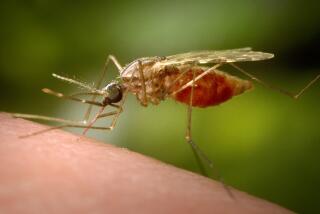Salk Reports Test Success of AIDS Virus Treatment
- Share via
MONTREAL — An AIDS immunization treatment developed by Dr. Jonas Salk, the polio vaccine pioneer, has apparently eliminated the AIDS virus from two infected chimpanzees, researchers reported Thursday.
The announcement was hailed at the international AIDS conference as a significant step toward a vaccine and improved therapies against the deadly human immunodeficiency virus, or HIV.
“We are talking about virus being there and then not being there after the treatment,” said Dani P. Bolognesi, an AIDS vaccine expert at Duke University. It is “an encouraging sign but . . . these experiments need to be solidified and repeated,” he added.
Salk and his collaborators cautioned that no such clearing of the virus has been demonstrated in HIV-infected humans since preliminary trials of the immunization treatments began at USC Medical School in November, 1987. But the primary purpose of that trial is to determine the safety of the immunizations in humans.
After more than a year of follow-up at USC, the technique appears to be nontoxic, according to USC’s Dr. Alexandra Levine, the principal investigator for the ongoing human trials. Moreover, about a third of the first 19 patients treated have laboratory evidence of improved immune system function, she said. But four of the patients have deteriorated, including two who have developed the full-blown acquired immune deficiency syndrome.
Nevertheless, Salk exuded optimism about the chimpanzee findings at a crowded press conference. “I think we are on the right path. We haven’t quite gotten to the end of it,” he said. Salk, of the Salk Institute for Biological Studies in San Diego, expressed the hope that, as with polio, there would eventually be a safe and effective AIDS vaccine that could be given to children.
The treatments are known as “HIV-immunogen.” They are prepared by stripping AIDS virus particles of the envelope proteins that surround them and rendering the particles non-infectious through the use of chemicals and radiation. The particles are then injected into the muscle or the skin.
The goal is for the particles to boost the immune system of the infected individual or chimpanzee so that it can destroy virus-infected cells and forestall further damage. Such an approach, of post-exposure immunizations, is occasionally used for other diseases, for example to prevent rabies after an individual has been bitten by a rabid animal.
So far, HIV-immunogen is not being tested as a vaccine for uninfected individuals, although the researchers hope to eventually begin such trials.
Unlike humans, HIV-infected chimpanzees do not become ill. As a result, some researchers point out that HIV experiments in chimpanzees may not be directly relevant to humans. On the other hand, the data can help investigators select therapies for human tests.
The new chimpanzee findings are based on experiments in four animals, two of which had been infected with HIV and two of which had never been exposed to the virus. The experiments were conducted at the National Institutes of Health in Bethesda, Md., by a team headed by Clarence J. Gibbs.
Over a period of months, the two HIV-infected chimps were given a series of three injections with HIV-immunogen. After the injections were completed, the chimps’ blood developed evidence of boosted immunity against HIV, Gibbs said. More significantly, the researchers could no longer isolate the virus from the animals.
Subsequently, the chimps were given an intravenous injection of another strain of HIV. Despite many attempts over the last year, HIV still could not be isolated. “The chimps cleared the infection and they failed to become reinfected,” Gibbs said. “We are quite satisfied at the moment that this shows substantial blocking of viral infection.”
One of the two chimps that had never been exposed to HIV was given a series of three HIV-immunogen injections. The other chimp was not injected and served as a control.
When injected with HIV, the control chimp quickly became infected. The immunized chimp also became infected. But Gibbs said the concentration of virus has subsequently declined in this animal, although HIV can still be detected with a sensitive test known as the polymerase chain reaction.
Bolognesi of Duke University said he was encouraged by the new data because it showed that “you can induce an immune response that can clear an (HIV) infection . . . I take it as a very positive step for vaccine development.”
In a plenary address, Bolognesi also cited research showing that two of six monkeys infected with a monkey virus similar to the AIDS virus had apparently been successfully vaccinated against the virus. That research, from the New England Primate Center in Southborough, Mass., was presented at the conference Wednesday.
Bolognesi said: “These are very early experiments and they have not all been confirmed but they are the beginnings, I believe, of piercing the armor . . . (of) this class of viruses.”
Dr. Robert C. Gallo of the U.S. National Cancer Institute, a co-discoverer of the AIDS virus, said the new findings are “important, incremental and not unexpected.”
The 19 patients in the preliminary USC trials each received a course of four injections over the last year. “There has been no significant toxicity whatsoever,” Levine said. Seven of the 19 patients have increased numbers of “T-4” white blood cells, a key immune system cell that is attacked by the AIDS virus. Eight patients have unchanged T-4 cell levels and four decreased levels.
In addition, six of the seven patients with increased numbers of T-4 cells had evidence of strengthened immunity to HIV, as measured by so-called skin tests that determine the ability of the body to mount an immune response to test injections of the HIV-immunogen.
Levine did not report the results of a larger HIV-immunogen trial at USC, involving about 50 HIV-infected individuals. She said this study should be completed by the end of the year.
DISEASES ON RISE--An expert says there’s an ominous epidemic of sexually transmitted diseases. Page 38





